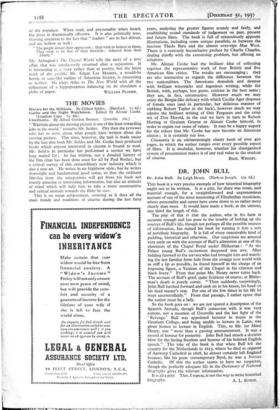DR. JOHN BULL
Dr. John Bull. By Leigh Henry. (Herbert Joseph. los. 6d.)
THIS book is a very precise example of how historical biography ought not to be written. It is a pity, for there was room, and
material enough, for a straightforward and unpretentious account of one of the most interesting of Elizabethan musicians, whose personality and career have come down to us rather more clearly than most. It would have made a book, at the utmost, one third the length of this.
The pity of this is that the author, who in his facts is accurate enough and has gone to the trouble of looking up the sources of Bull's life, though not perhaps all the possible sources of information, has ruined his book by turning it into a sort •
of novelistic biography. It is full of every conceivable kind of padding, historical and otherwise. Our suspicions are aroused very early on with the account of Bull's admission as one of the choristers of the Chapel Royal under Blitheman : " At the Palace young Bull's excitement deepened into awe. After bidding farewell to the servant who had brought him and watch- ing the last familiar form fade from the strange new world with as stiff a lip as possible, he found himself in the charge of an imposing figure, a Yeoman of the Chapel in his crimson and black livery." From that point Mr. Henry never turns back. The account of Bull's grief, quite fictitious of course, at Blithe-
man's death is purely comic. "Then suddenly, surprisingly, John Bull lurched forward and sank on to his knees, his head on his dead master's seat. For one of the few times in his life he wept uncontrollably." From that passage, I rather opine that the author must be a lady.
So the book goes on : we are not spared a description of the Spanish Armada, though Bull's connexion with it was very remote, nor a mention of Grenville and the last fight of the Revenge.' Bull was appointed lecturer in music at the Gresham College, and being unable to lecture in Latin, was given licence to lecture in English. This, to Mr. (or Miss)
Henry, was " more than a passing announcement. It was a record of honour for posterity. John Bull had struck a decisive
blow for the lasting freedom and honour of his beloved English speech." The joke of the book is that when Bull left the country for the Netherlands in 1613, where he died as organist of Antwerp Cathedral in 1628, he almost certainly left England because, like his great contemporary Byrd, he was a Roman Catholic. Of this the author seems to have no suspicion, though the perfectly adequate life in the Dictionary of National Biography gives the relevant information.
It is all a pity: This, I repeat, is not the way to write historical
































 Previous page
Previous page